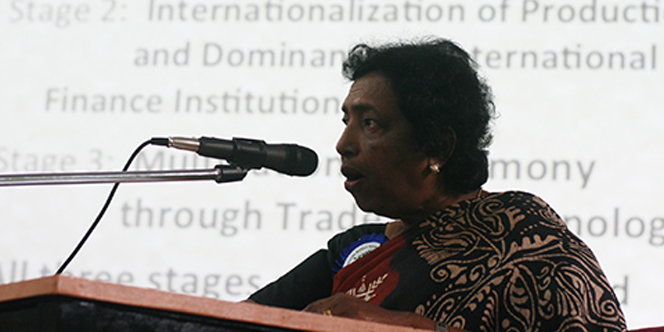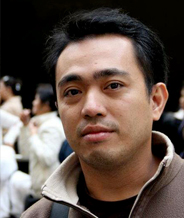Irene Fernandez: Anti-imperialist, well-loved by Filipinos
Activists and people from varied oppressed sectors all over the world mourned the passing of Irene Fernandez, a known Malaysian human rights activist who succumbed to heart failure last March 31, at the age of 67. Since news of Fernandez’ death, tributes have poured in, propelled mostly by the heartfelt gratitude expressed by the multitudes […]


Activists and people from varied oppressed sectors all over the world mourned the passing of Irene Fernandez, a known Malaysian human rights activist who succumbed to heart failure last March 31, at the age of 67.
Since news of Fernandez’ death, tributes have poured in, propelled mostly by the heartfelt gratitude expressed by the multitudes of migrant workers, peasants, and women whose rights and welfare she had advocated for steadfastly throughout her life. Hailed as “champion of the oppressed” in several international media outfits, Fernandez has made her mark globally as an important activist figure with a remarkable legacy.
Filipinos are among those who worked closely with Fernandez, and who considered her as a dear comrade. Many of the subjects of Fernandez’ famous 1995 report on detained migrant workers in Malaysia were Filipinos. For more than a decade, the Malaysian government persecuted Fernandez for the report, which exposed for the first time the dehumanizing conditions suffered by migrant workers in the hands of authorities and their employers.
Fernandez meanwhile tirelessly worked to improve the lives of migrant workers, as executive director of the organization Tenaganita (Women’s Force). The charges filed against her by the Malaysian government were dropped in 2008, but her activism continued, and went way beyond her own country and organization.
At the time of her death, she was working with numerous organizations in various countries, as well as in global anti-imperialist formations that put her in close touch with Filipinos. Fernandez was vice-chairperson of the International Migrants Alliance (IMA), co-founder of the International League of Peoples Struggles, and steering council member of the Asian Peasant Coalition (APC) and Asian Rural Women’s Coalition, among others.
Fernandez was especially known for her uncompromising stance on the various issues she was involved in, while maintaining a motherly warmth towards the people she served and worked with. Those who have heard her speak knew her to be a staunch anti-imperialist, always articulating the view that oppression stems from an unjust and exploitative system.
In her keynote speech at the IMA founding assembly in Hong Kong last 2008, Fernandez expressed the depth of her political views. She said:
“The proletariat is one class, worldwide. Proletarians in every country share a common interest—a world without classes and class distinctions and all the oppressive ideas and institutions that go along with those distinctions; a world where the division between oppressor and oppressed nations has been overcome through struggle and where, ultimately, borders become a thing of the past. That is the outlook of proletarian internationalism, and it requires a struggle against the oppression of nations and against the persecution of any section of the proletariat on the basis of that oppression.
The bourgeoisie constantly fights to divide the proletariat along national lines, appealing to people on the narrow basis of ‘me first.’ This is national chauvinism. It is the outlook and ideology of the enemy, and it must be defeated—in the realm of ideas and, very concretely, by getting out and joining in the struggle against national oppression.”
She further said: “It is only by placing the local issues and struggles in a global context that we can make sense of what is being attempted by the forces of capital, patriarchy and imperialism. And it is only by sharing information, strategies and making the connections that we can be successful in confronting with a socialist perspective.” Fernandez then ended her speech by saying, “a revolution requires a revolutionary movement.”
Tributes, remembrances from Filipinos
According to Rafael Mariano, chairperson of the Peasant Movement of the Philippines and APC, Fernandez had exposure visits to the Philippines, and that “the spirit of the Filipino peoples’ movement challenged her.” He also said that she was inspired by women and worker leaders from other underdeveloped countries, such as Sri Lanka, Brazil, Chile, and Argentina.
“Irene’s sudden death shocked us, and we are very saddened. However, our beloved Irene will always inspire our struggle with the toiling masses for meaningful social change. We call on the people who were inspired by her sincere work to translate their sympathy and grief to more painstaking work to serve the oppressed people,” Mariano said in a video message sent to Fernandez’ family, friends and comrades.
Fernandez’ had received numerous prestigious awards in her lifetime: the Human Rights Watch Award in 1996; the Amnesty International Award in 1998; the International PEN Award in 2000; the Jonathan Mann Award in 2004; and the Right to Livelihood Award in 2005.
One of the last awards she received, however, came from an organization of poor peasants. The APC honored her as an outstanding advocate of the struggle for land reform, during a protest camp against the World Trade Organization in Bali, Indonesia last December 2013. Fernandez was too frail to travel to receive the award, which was received on her behalf by her daughter Tania.
Migrante International also paid tribute to Fernandez, who served as an expert witness for the International Migrants’ Tribunal held in Manila last November 2012. In the tribunal, she related how migrant workers in Malaysia and elsewhere continue to suffer because of neo-liberal policies that commodify labor. Also unable to travel because of her health, she nonetheless delivered her testimony via Skype.
“Fernandez’ work and courage will serve as inspiration to all migrant workers and migrants’ rights advocates around the world,” said Garry Martinez, Migrante chairperson.
Other Filipino migrants also fondly recall Fernandez. Aaron Ceradoy, program coordinator of the Asia Pacific Mission for Migrants in Hong Kong, said, “The most important thing I remember about Irene is her defense of the grassroots. Her belief that there are experts among the grassroots echoes in the midst of the tendency of some development workers to put themselves above the people they profess to serve. She reminds us all of the power of the collective will and action of grassroots people to achieve social change.”
Fernandez also served as a juror in a Permanent People’s Tribunal held in Manila against human rights violations committed by the Arroyo administration. King Catoy, a human rights victim and witness in the tribunal, said that the presence of personalities such as Fernandez who gave the government perpetrators a ‘guilty’ verdict “meant a lot to us victims who were deprived of justice through the legal system.”
Fernandez was in fact on her way to another tribunal–the Bersih’s People’s Tribunal on the 13th General Elections– in Malaysia when she suffered a heart attack. She was briefly able to recover in the hospital, but had a fatal relapse.
In a statement, Jose Ma. Sison, ILPS chairperson, said, “Indeed, Irene lived a life full of service to the poor, oppressed and exploited people. She was imbued with the anti-imperialist and democratic commitment for fundamental change, especially for the national and social liberation of the peoples in the underdeveloped countries. She embodied moral strength and courage as she engaged in struggles against injustice, despite her health problems.
She will forever be remembered as a highly principled and fearless activist, a wise advocate, an inspiring mentor, and an anti-imperialist and democratic fighter. A servant of the people and a fighter until the end – this will be how migrants, women, youth, workers, peasants and countless other people shall always regard our beloved colleague and fellow fighter, Irene Fernandez.”
Fernandez is survived by her husband of 35 years, Joseph Paul, and three children.

